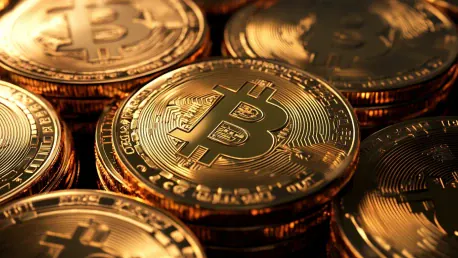In a world increasingly turning to digital solutions, the announcement on March 2, 2025, by former President Donald Trump regarding the formation of a strategic crypto reserve has sparked excitement and controversy across the financial sector. As digital assets become more integrated into the mainstream economy, the government’s involvement in cryptocurrency containment holds profound implications for decentralization, one of the core principles championed by the blockchain community.
Decentralization at Risk?
Responses from Industry Leaders
The moment Trump declared the formation of a crypto reserve, the market responded with fervor. Bitcoin surged past the $94,000 mark, and Ether also saw a substantial increase of 19%. Despite the market’s positive response to Trump’s proposal, industry leaders expressed their concerns. Anatoly Yakovenko, co-founder of Solana, strongly denied rumors suggesting that Solana lobbied for the network’s inclusion in the crypto reserve. The decentralized nature of Solana, according to Yakovenko, makes formal representation infeasible. He equated the situation to suggesting the need for a spokesperson for Bitcoin, advocating that Solana remains true to its decentralized ethos.
Yakovenko criticized the concept of a government-controlled crypto reserve, suggesting that it might undermine the principle of decentralization. He proposed that if a reserve was indeed necessary, the optimal model would be allowing individual US states to manage their own crypto assets. Such decentralization at the state level, he argued, would promote economic competition and serve as a safeguard against potential Federal Reserve mismanagement. The necessity for transparent, objectively measurable criteria in any reserve was also emphasized by Yakovenko. Despite his principled stance, he remained confident that the Solana ecosystem could meet any reasonable benchmarks if they were clearly defined, showcasing his belief in the network’s robust and adaptable nature.
A Divide in Perspectives
The broader crypto industry echoed Yakovenko’s skepticism surrounding Trump’s proposal. Notable figures such as Lee Bratcher, president of the Texas Blockchain Council, argued that Bitcoin should be the sole occupant of the government reserve due to its established and decentralized status. Bratcher emphasized Bitcoin’s unparalleled security and long-standing track record as the foremost digital asset, asserting it as the most logical choice for a state-backed reserve. Echoing this sentiment was Brian Armstrong, CEO of Coinbase, who envisioned a Bitcoin-only reserve. Armstrong believed that narrowing the reserve to Bitcoin would simplify the management process and position Bitcoin as the clear successor to gold, gaining a prominent role in the traditional financial system.
Despite the substantial opposition, Trump’s proposal did arouse enthusiasm among crypto investors, hinting at a potential shift in Washington’s approach towards digital assets. The establishment of such a reserve signals a move toward broader acceptance and mainstream adoption of cryptocurrency. Supporters view the move as a positive step towards the legitimization of digital assets in the eyes of regulatory agencies and institutional investors, possibly paving the way for innovation and growth within the sector. However, opponents like Yakovenko fear the establishment of the reserve could regulate the industry too heavily, stripping it of its decentralized philosophy, which is seen as essential to the integrity and future of blockchain technology.
Potential New Landscape
The Future of Government and Blockchain
With the 2024 election looming, Trump’s crypto policies are of cardinal importance, promising to be a significant point of debate. Yakovenko and his allies represent a firm boundary against excessive government control in the crypto sphere. The co-founder’s call for state-level management and transparent criteria reflects a broader desire within the industry for autonomy and clear, fair guidelines. By contrast, the prospect of a centralized federal reserve raises anxiety among blockchain advocates who fear it could potentially stifle innovation and centralize power, contrary to the decentralized nature that cryptocurrencies strive to uphold.
Yet, the fact remains that Trump’s proposal has stirred the waters of Washington’s cryptocurrency policy debate. Industry leaders, policymakers, and investors are now engaged in an intense dialogue about the balance between government involvement and maintaining the industry’s foundational principles. This charged environment is not just about the immediate response to the proposal but rather sets the stage for ongoing discussions that will shape the future of digital currency in the United States. This tension highlights the importance of establishing regulations that both encourage innovation and protect the principles of decentralization, ensuring that blockchain technology continues to evolve.
Implications and Considerations
In an increasingly digital world, the announcement on March 2, 2025, by former President Donald Trump about establishing a strategic crypto reserve has ignited both excitement and debate in the financial sector. As digital assets like cryptocurrencies become more integrated into the mainstream economy, the government’s involvement in managing these resources has profound implications. This move raises significant questions about decentralization, a core principle upheld by the blockchain community. Critics argue that government intervention could undermine the very foundation of decentralized finance, while proponents believe it could offer stability and security to this emerging market. The creation of a crypto reserve may signal a shift in how digital currencies are perceived and regulated, potentially paving the way for broader adoption and stricter oversight. As the financial sector grapples with these changes, the impact on both supporters and skeptics of cryptocurrency will likely be profound and far-reaching.









